Frequently Asked Questions about Rosacea
WHEN SHOULD I SEE A DOCTOR ABOUT MY ROSACEA?
- You should see you doctor if any of the following symptoms persist:10
-
- Areas of redness on your face;
- Embarrassment, anxiety, or frustration caused by deep blushing or redness on your face or neck;
- Your skin burns, stings, or swells during periods of flushing;
- Pimples, red bumps, and persistent red areas on your facial skin;
- Your eyes are frequently bloodshot, watery, and irritated.
WHAT ARE MY TREATMENT OPTIONS?
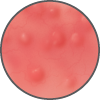 |
Sticking with the treatment recommended by your doctor will improve symptoms within a few weeks.1 |
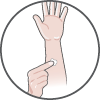 |
Compliance with therapy – using your medication exactly as your doctor prescribes it – is an important key to success.11 |
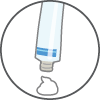 |
Apply any topical medication and allow it to absorb completely before you apply moisturizer or makeup.12 |
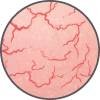 |
Rosacea is characterized by flare-ups and remissions. It is best to keep using your medications in between flare-ups in order to prevent them.9 |
IS IT POSSIBLE TO GET RID OF ROSACEA SCARS?
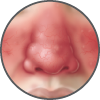 |
Scarring can be minimized. Ask your dermatologist about the best approach for you. |
 |
Rosacea can last for many years and does not go away on its own. If left untreated, the condition may get worse. There may be permanent skin and eye damage in the long term, so the best cure for scarring is prevention; be sure to treat rosacea symptoms early.10 |
 |
For severe scars, treatment options include: surgery using lasers (electrocautery or excision).13 |
REFERENCES
- Rosacea. Canadian Dermatology Association. http://www.dermatology.ca/skin-hair-nails/skin/rosacea/. Published 2016. Accessed August 19, 2016.
- All About Rosacea. National Rosacea Society. https://www.rosacea.org/patients/allaboutrosacea.php. Published 2016. Accessed August 19, 2016.
- Rosacea: Overview. Mayo Clinic. http://www.mayoclinic.org/diseases-conditions/rosacea/home/ovc-20235169. Published 2016. Accessed August 19, 2016.
- Rosacea. National Institute of Arthritis and Musculoskeletal and Skin Diseases. http://www.niams.nih.gov/Health_Info/Rosacea/default.asp#1. Published April 2016. Accessed August 19, 2016.
- Rosacea: Who Gets and Causes. American Academy of Dermatology. https://www.aad.org/public/diseases/acne-and-rosacea/rosacea#causes. Published 2016. Accessed August 19, 2016.
- Rosacea: Diagnosis and Treatment. American Academy of Dermatology. https://www.aad.org/public/diseases/acne-and-rosacea/rosacea#treatment. Published 2016. Accessed August 19, 2016.
- Factors That May Trigger Rosacea Flare-Ups. National Rosacea Society. https://www.rosacea.org/patients/materials/triggers.php. Published 2016. Accessed August 19, 2016.
- Rosacea: Tips for Managing. American Academy of Dermatology. https://www.aad.org/public/diseases/acne-and-rosacea/rosacea#tips. Published 2016. Accessed August 19, 2016.
- Frequently Asked Questions. National Rosacea Society. https://www.rosacea.org/patients/faq.php#effectiveness. Published 2016. Accessed August 19, 2016.
- When to see a Doctor. Acne and Rosacea Society of Canada. http://www.rosaceahelp.ca/about-rosacea/when-to-see-a-doctor/. Published 2016. Accessed August 19, 2016.
- Medical Therapy for Rosacea. National Rosacea Society. https://www.rosacea.org/patients/managementoptions/medicaltherapy.php. Published 2016. Accessed August 19, 2016.
- Make-up and Concealers. Acne and Rosacea Society of Canada. http://www.rosaceahelp.ca/take-action/action-article-7/. Published December 12, 2014. Accessed August 19, 2016.
- How Do I Treat Skin Thickening? Acne and Rosacea Society of Canada. http://www.rosaceahelp.ca/take-action/action-article-8/. Published December 10, 2014. Accessed August 19, 2016.
